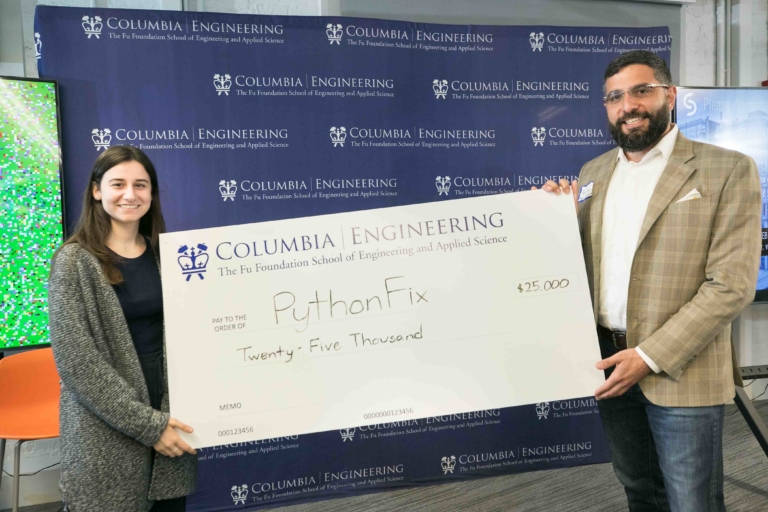Venture Competition 2022 Recap

APR 19, 2022 | KIMBERLY LIU
On April 7th, startup teams in Columbia Venture Competition’s Technology Challenge gathered at Columbia Engineering’s new Innovation Hub in the Manhattanville campus for the announcement of the winning teams.
Now in its eighth year, Columbia Venture Competition (CVC) is one of the top five largest university-based business plan competitions in the country. The Technology Challenge, organized by Columbia Engineering Entrepreneurship, offers the top three teams a total of $50,000 in prizes.
This year, SEAS students and alumni startup finalists presented solution-focused technological innovation ranging from sustainable packaging for businesses (FreedaPrint) to a web-based marketplace for research papers to be shared as NFTs (Scriptus). Other finalists include InPin, a social-media, data-driven version of “The Infatuation”; AI Diagnosis, an AI-based web platform that generates reports from X-rays; Nourish, a tool that offers product sustainability information at the time of purchase to aid customers in making more informed purchases; and IOTRevolution, a connected device that measures the vibration of machine pumps to anticipate and prevent damage.
In third place winning a $10,000 prize was ViveSense, an at-home male fertility testing service co-founded by Benjamin Greenfield, SEAS ‘20. ViveSense aims to fill an unmet market need by increasing accessibility of male fertility testing. ViveSense is currently patent pending.
Taking home second place with $15,000 was Ocular Diagnoses, an AI-based ADHD detection software co-founded by William Das, CC ‘25. “Automated,” “accurate,” and “accessible,” Ocular Diagnoses’ platform uses deep learning algorithms to analyze users’ pupillary responses to visuospatial tasks. A summary of biometric data, statistics, and the probability of a user having ADHD is then presented to help clinicians and psychiatrists make more informed diagnoses. Columbia’s funding will allow Das to begin the first round of decentralized clinical trials.
Winning the first place prize of $25,000 was PythonFix, a 3D-printed surgical fixture for rotator cuff tears. Named after the teeth of the python which curve backwards to effectively hook into flesh, PythonFix grabs onto tendon tissue rather than cutting through it the way sutures do. PythonFix addresses the high failure rate of rotator cuff repair surgeries by reducing the need for a second surgery by at least 20%.
PythonFix is currently in the preclinical testing stage. “Columbia has been instrumental in getting this technology into the market and starting commercialization steps,” says PythonFix founder and patent-holder, Iden Kurtaliaj, PhD Biomedical Engineering ‘22.
PythonFix won first place in the graduate group of Columbia Engineering Entrepreneurship’s Fast Pitch competition last fall, receiving $1,200.
With Columbia’s support, PythonFix will now move forward to obtain FDA approval.
